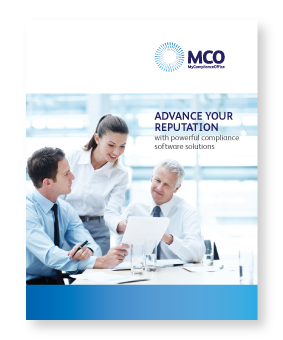Recidivist Representatives & Thier Employees
You can download a full copy of the slides from this webinar.
Full video transcript available below:
|
Thank you, Colleen. Now we'll talk about the next priority which is recidivist representatives and their employees. This was also noted, again in last year's 2016 examination priorities, and it's more relevant to the SEC's initiative to protect retail investors. The SEC did indicate they would conducting examinations of such advisors, so be on alert and be prepared if this applies to you if your firm or you have a supervised person that has some kind of past transgression. |
|
Now note that the SEC will use the information disclosed in the form ADV part two to I guess narrow down the universe to folks that would fall into this category, but they'll also consider other actions that are not required to be disclosed on form ADV. They'll also consider other enforcement actions, and they'll also consider their own experience with the firm either good or bad and the controls of the firm during past investigations or prior examinations. |
|
First and foremost, you should review the risk alert, the examination of supervision practices at registered investment advisors. This will help assist you with a preparation of an SEC exam. In this alert, OC indicated that the exams will assess whether advisors, one, implemented policies and procedures specific to the risk presented by employees with a disciplinary history, and two, will focus on the compliance culture and tone at the top of the examined advisors. If you have a disciplinary event make sure that you've adopted specific policies and procedures to address this, and you have adequate disclosures and a program to oversight such persons with prior transgressions. |
|
Now keep in mind that a firm's disciplinary history can be important. I personally think it's a good thing that the SEC is focusing its resources on firms that have themselves or have supervised persons that have prior regulatory transgression. In the examination alert, it did say that studies have shown that firms and employees with misconduct records are significantly more likely to engage in new misconduct at another firm. The studies also show that misconduct is more concentrated in firms that have retail customers who are less sophisticated. I do think this is a very important initiative. |
|
This is also where compliance oversight is so imperative. There are a number of activities that you can conduct, particularly and this is something you should do since this is an exam priority. First, you should first if I'm the CCO of a firm I'm going to obtain a background check of all new employees. I would also do a broker check as well to see if any new or prospective employee had security license or had any compliance matters in the past. You should also as a CYA in a sense for yourself provide employees with a disciplinary questionnaire initially and also on an annual basis. In furtherance of that, built into your compliance policies and procedures that if there have been any changes the disciplinary information reported initially or annually that the CCO of the firm be immediately informed. |
|
Then another best practice in addition to the disciplinary questionnaire and background check is that if your firm does have a record of some kind of misconduct, I would create a memo to the compliance file with respect to the issue so you're prepared when the SEC comes in covering a number of topics. The topics that I would cover I would explain the issue, explain how the transgression could potentially even if remote affect the fiduciary duty of an advisor, and then explain in detail the heightened controls that the firm has adopted and the specific policies and procedures to prevent those situations and transgressions from happening again. |
|
At the end of the day, the goal is to really demonstrate to the SEC that your compliance program now and at the current firm is stronger than at the firm at where the past transgression occurred even if it's your own firm and that you improved your compliance policies and procedures. That should be your goal if you do have an employee or if your firm has had a past violation. |
|
Then a final note with respect to recidivist violations and disclosures, there have been a number of charges against recidivist violators which does support the SEC's focus on the premise that it should focus on these advisors. It does seem to me in many of the cases it's the unsophisticated investors that are the ones being duped. It's always a shame, but it's always saddening when that's the case. I expect that this is a topic that will continue to remain high on the SEC's radar. Of course, in your form ADV you want to make sure that you're always disclosing any disciplinary events that are required to be disclosed. If you are able to as in accordance with the SEC directions overcome the presumption that a specific violation or deficiency in your part two of form ADV is not material. Make sure that you maintain very strong documentation if this is something you're not going to disclose. |
|
At this point, I will turn it over to Colleen to discuss the examination priority.
|
Read 5 ways to improve Hedge Fund Compliance
This webinar was cohosted with NorthpointCompliance


